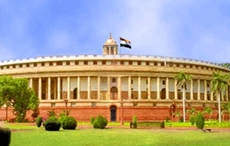MPs vow to shun disruptions on Parliament’s 60th anniversary
14 May 2012
 Moreover, opposition leaders virtually vowed to show greater decorum and not disrupt the house over every issue. Adjournments caused by pandemonium, members rushing to the well of the House, and an unwillingness to participate in discussions were some of the concerns expressed by MPs cutting across party lines.
Moreover, opposition leaders virtually vowed to show greater decorum and not disrupt the house over every issue. Adjournments caused by pandemonium, members rushing to the well of the House, and an unwillingness to participate in discussions were some of the concerns expressed by MPs cutting across party lines.Prime Minister Manmohan Singh initiated the debate in the Rajya Sabha and finance minister Pranab Mukherjee in the Lok Sabha in their capacity as the leaders of the respective Houses. As the sittings extended till the evening, the prime minister Singh spoke in the Lok Sabha too, winding up the debate. Both Houses passed a resolution to uphold the dignity and supremacy of Parliament.
Singh said routine disruptions led to questions about the functioning of Parliament. He called for a ''substantive and sincere'' introspection. Public disenchantment was bound to rise if the parties failed to collectively resolve to restore the prestige of the institution, he said.
The manner in which the MPs had conducted themselves, especially over the last couple of years, led to a sense of ''frustration and disillusionment'' among the people. ''If we have to restore the prestige of the institution, then each one of us needs to lead by example,'' he told the members.
Mukherjee echoed these sentiments in the lower house, regretting that a handful of MPs had repeatedly throttled the ''silent majority''. He called for a mechanism that would eliminate disruptions. ''On many occasions, this House has been tumultuous, tempers ran high - but disruption is the least [of unsavoury methods] this House has adopted.''
Parliament had acted as a ''shock absorber'' on several occasions and whenever there were disputes or dissensions, Lok Sabha had played a role in defusing the tension, he said.
There had been confrontation on the federal structure between various organs of the government and the judiciary, the executive and the legislature. ''But over the years, we have evolved a system and are able to find an amicable solution,'' Mukherjee said.
Speaker Meira Kumar said it was an occasion for the members to introspect and think about the future. People deserved the real credit for the success of democracy, as it was their participation in elections that kept the institution of Parliament alive.
Senior BJP member L K Advani called for tolerating dissent, which he said was the hallmark of the country's cultural ethos and of any democratic society. There should not only be tolerance, but respect as well for dissenting ideology. When India adopted the parliamentary system, there was scepticism about its success. But the ordinary people of this country proved the sceptics wrong, he said.
Speaking in the Lok Sabha after a long gap, senior Congress member Sonia Gandhi said while Parliament's integrity and independence must be preserved at all costs, it must not only be a source of law and power but also of justice and compassion. The MPs' conduct must rise to the highest ethical standards. The greatest triumph of the country now was that the ''aam aadmi'' (common man) had become the heart and soul of Indian democracy.
Leader of the Opposition Sushma Swaraj sought greater representation for women in Parliament, up from the present 11. She also expressed her displeasure at the frequent adjournments due to disruptions and disagreements between both sides of the political divide, as also over the adjustments of coalition politics of the last 18 years.
In the Rajya Sabha, leader of the opposition Arun Jaitley said there were so many countries which became independent with India and adopted democracy, but then fell into dictatorship. India, thanks to an intrinsic culture of accommodation and tolerance, survived as a democratic society. ''We still continue to face the curse of terrorism and insurgency. Let us resolve that there should be no politics on these issues,'' he said.
Sitaram Yechury (CPI-M) pointed out that the efficiency of Indian Parliament depended to a large extent on the duration and proper conduct of the parliamentary proceedings. During the last two decades, Indian Parliament never sat for more than 100 days in a year while the British Parliament sat for at least 160 days. ''We must seriously consider, through a Constitutional Amendment if necessary, making 100 sittings in a year mandatory. I think that is necessary as a corrective step for the future,'' he suggested.
The session ended with the House adopting a resolution unanimously, expressing determination to work for the betterment of the people.



















